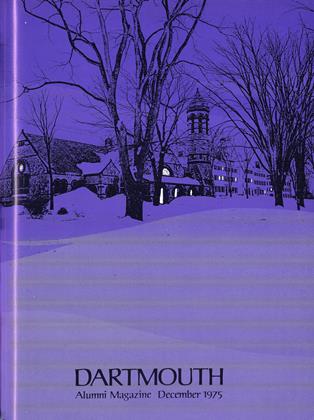The Class of 1930 Fellowship was established by class members who hoped the College would continue Ernest Martin Hopkins' tradition of inviting distinguished men and women to Hanover to deliver a major address and spend several days speaking with undergraduates and faculty members. The first Class of 1930 Fellow was a man who didn't have to set aside time for travel or make complicated plans. President Emeritus John Sloan Dickey came all the way from Lyme Road on the outskirts of town and spent a busy two days speaking on his topic, "The Citizen and His Foreign Affairs: Power, Policy and Process."
Mr. Dickey called for bridging the gap between Presidential leadership and Congressional sanctions in international affairs in his formal speech in the Hopkins Center Theater. "As shareholders in the nation," he said, "we want it to work; that is to say, we want the protection of its power, we want its policies to serve the welfare of our society, and we want processes that make us participants in shaping the destiny of both ourselves and the nation."
Mr. Dickey's nonstop schedule began Tuesday morning, November 18, when he appeared as a guest on WDCR. His address was delivered that evening, followed by a reception at Casque and Gauntlet. He was up early enough Wednesday morning to join faculty and students in a discussion over coffee and doughnuts before being spirited away to speak with members of an introductory class in international relations.
Surrounded by students who filled all the chairs in the Government Department's Masland Lounge and most of the floor space, Mr. Dickey explained his belief that it is in the American interest to stop asserting the right of first-strike in the realm of nuclear warfare. The first-strike threat, he said, might "heighten the temptation of an enemy not to be second."
Mr. Dickey said he preferred retaining stockpiles of nuclear weapons instead of moving toward total disarmament. Basing his preference on the "bedrock fact" that the knowledge of how to make such weapons "is now and forevermore in the worldwide public domain," he said today's nuclear deterrence is the best alternative to worldwide catastrophe and is "the name of this god-awful game for years to come."
He also expanded his warnings against recent trends he fears may turn the United States into an "anything goes society." He pointed out that the nation, "in trying to beat the Soviet at its own game," came "much too close to the brink of being such a society," and cited recent CIA and FBI revelations as evidence.
While 1930 left itself open to some jabs from its guest, whose allegiance belongs to 1929, class president John French did find reason in his introduction to praise the first Class of 1930 Fellow.
The only blemish on the event, we understand, was the Hopkins Center sound system. "After 30 years," one observer of the Dartmouth scene said wryly, "people around here ought to know that John Dickey doesn't need a microphone to make himself heard."
 View Full Issue
View Full Issue
More From This Issue
-
 Feature
FeatureQuite Contrary
December 1975 By SAMUEL PICKERING -
 Feature
FeatureThe Assault On Quebec
December 1975 By LEWIS STILWELL -
 Feature
FeatureHigh On Your Dial
December 1975 By DAN NELSON -
 Feature
FeatureDartmouth Radical Union
December 1975 By M.B.R. -
 Class Notes
Class Notes1959
December 1975 By DOUGLAS WISE, BARRY R. BLAKE -
 Class Notes
Class Notes1950
December 1975 By JACQUES HARLOW, EDWARD TUCK II
Article
-
 Article
ArticleIndependent Artist
March 1948 -
 Article
ArticleSenior Fellows
November 1957 -
 Article
ArticleThe 1968 Calendar
DECEMBER 1967 -
 Article
ArticleGrenville Clark Prize
JULY 1973 -
 Article
ArticleThe Seniors Writ Large: Some Sit Right, Some Don't
June 1976 By D.M.S. -
 Article
ArticleA Notable Collection of Fifty Prints Given to the College by Mrs. Wade
October 1950 By R.L.A.


